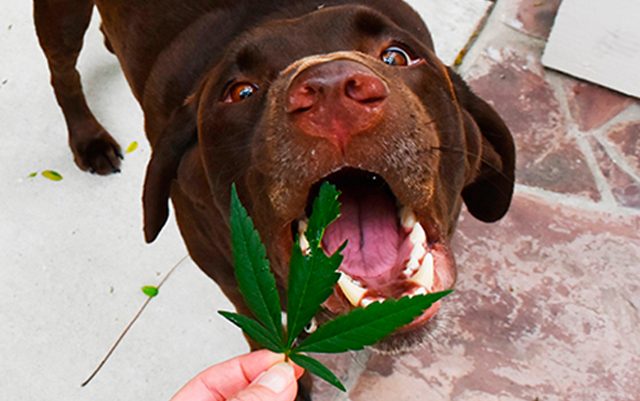The cannabis lifestyle is great for those who choose to consume, but is cannabis okay for your pet? When it comes to furry friends and THC – the answer is definitely no, it’s not safe to feed Fido any marijuana.
Just because pet owners are already using cannabis as medicine, doesn’t mean it’s safe for animals. Experts blame the lack of research into how animals react to the main compound in the plant – and the psychoactive ingredient – tetrahydrocannabinol (THC).
The American Veterinary Medical Association (AVMA) says studies are needed before pot therapy is practiced, and a first step in the right direction is for veterinarians to join the debate.
Dr. Dawn Boothe is the director of the Clinical Pharmacology Laboratory at Auburn University’s College of Veterinary Medicine and a diplomate of the American College of Veterinary Internal Medicine and the American College of Veterinary Clinical Pharmacology. The AVMA published her article about animals and cannabis.
“My gut reaction is they do probably provide some therapeutic effect benefit,” said Dr. Boothe. “But,” she quickly added, “I’m never going to say there’s enough benefit that marijuana should be given to pets. I’m saying there’s enough justification that we need to study it.”
What we do know, thus far, is that people can’t assume that cannabis affects canines and humans in the same ways. Cannabis is touted as a ‘natural’ medicine by many, but that’s a dangerous assumption because in large enough quantities, it can be deadly for animals.
“Veterinarians do need to be part of the dialogue. We should be kept in the loop in terms of translational medicine aspects,” Dr. Boothe says in her AVMA article. “I can see a well-designed, controlled clinical trial looking at the use of marijuana to treat cancer pain in animals. That would be a wonderful translational study, with relevance to both pets and their people.”
Concerns over canine consumption
A study from 1983 finds that 130mg of THC per kg of the animals’ weight killed half the dogs tested. That means an animal must consume a considerable amount of THC for it to become lethal. It’s also notable that the study administered the THC intravenously, directly into the bloodstream.
 Colorado vet Dr. Robin Downing is one of the top animal pain-management specialists in the country. She told The Denver Post that cannabis therapy for animals is untried, unproven, unregulated medicine. “Any time you use untested therapy, there are increased risks,” she says, “We have good (pain) tools already.”
Colorado vet Dr. Robin Downing is one of the top animal pain-management specialists in the country. She told The Denver Post that cannabis therapy for animals is untried, unproven, unregulated medicine. “Any time you use untested therapy, there are increased risks,” she says, “We have good (pain) tools already.”
Downing isn’t ruling out the possibility of pot, but she says more research is needed.
“We know dogs and cats have cannabinoid receptors,” she says in the article, “but we don’t really know at this time how we get to this receptor in pets. We have no knowledge of how pot metabolizes in them; how many milligrams of pot we need to treat them; what form we should administer it in; and how long it stays in the body.”
People for the Ethical Treatment of Animals
On their website, PETA has an article written by Dr. Amanda Reiman, the California policy manager for the Drug Policy Alliance (DPA). Reiman leads the DPA’s marijuana reform work in California, and has conducted some studies on medical marijuana dispensaries, medical marijuana patients, and the use of marijuana as a treatment for addiction.
“Having an animal companion is one of the greatest joys in life, and supporting him or her through illness and the end of life can be one of the most difficult times,” she wrote.
She goes onto share her story about her decision to use cannabis to help her very sick feline companion.
Her cat was diagnosed with intestinal cancer. The cancer caused a significant amount of weight loss, as well as trouble sleeping. “I decided to mix a little cannabis oil in with her wet food and was astounded at the difference. She started acting like a kitten again, able to eat and play,” she wrote.
“Given that our animal friends may not be able to show us how they are feeling with complete accuracy, we are often left to make decisions about their medical treatments based on advice and good intentions.”
Please note that it’s not recommended to give pot to your pet. Instead, experts advise pet owners to check with their vet first.
CBD for your canine
The non-psychoactive part of the plant, cannabidiol (CBD), does have some promising studies supporting it as a treatment for some disorders in animals. As reported by The Marijuana Times last Spring, CBD can safely treat inflammation, pain, cancer-related health problems, and can also be used for palliative care or end-of-life ailments.
A survey study conducted by AHVMA reports that 61.8% to 95% of pet owners have endorsed the health benefits of CBD-laced treats, ranging from ‘moderate to excellent’.
Canna-Pets
One company, CANnabinoid Nutrition Adapted for Pets, has developed a line of products that use the therapeutic benefits of whole plant extracts and high CBD levels.
 One of the most common issues treated with these treats is doggie anxiety. Dogs can experience anxiety for a number of reasons. They might get upset when you leave the house or when they’re on a new schedule. They may have been in a fight or gone through some sort of medical trauma recently. Regardless of the cause, anxiety happens to dogs young and old for a variety of reasons.
One of the most common issues treated with these treats is doggie anxiety. Dogs can experience anxiety for a number of reasons. They might get upset when you leave the house or when they’re on a new schedule. They may have been in a fight or gone through some sort of medical trauma recently. Regardless of the cause, anxiety happens to dogs young and old for a variety of reasons.
According to PetMd, there are a few types of animal anxiety:
- Mild fears: signs may include trembling, tail tucked, withdrawal, hiding, reduced activity, and passive escape behaviors
- Panic: signs may include active escape behavior, and increased, out-of-context, potentially injurious motor activity
- Classic signs of sympathetic autonomic nervous system activity, including diarrhea
- Anxieties: lesions secondary to anxious behavior (such as licking and biting at the self)
And the causes of your pet’s anxiety could be triggered by the following:
- Any illness or painful physical condition increases anxiety and contributes to the development of fears, phobias, and anxieties
- Aging changes associated with nervous system changes; infectious disease (primarily viral infections in the central nervous system), and toxic conditions, such as lead poisoning, may lead to behavioral problems, including fears, phobias, and anxieties
- Fear from a terrible experience; dog may have been forced into an unfamiliar and frightening experience
- Dogs that are deprived of social and environmental exposure until 14 weeks of age may become habitually fearful
- Phobias and panic may have a history of inability to escape or get away from the stimulus causing the phobia and panic, such as being locked in crate
- Separation anxiety: history of abandonment, multiple owners, rehoming, or prior neglect is common; exacerbating the condition may be that the dog has been often abandoned or rehomed because of separation anxiety
There are hundreds of personal stories by pet owners about their experience using CBD for their animal companions. Many of these personal accounts describe positive experiences using CBD as treatment.
Experts say to check with your vet first because there are other avenues of treatment for issues like anxiety. Some remedies include training and increased exercise. It’s also important to consult with your vet because the symptoms could be a response to something toxic in its environment, which can be identified with a simple blood test.






